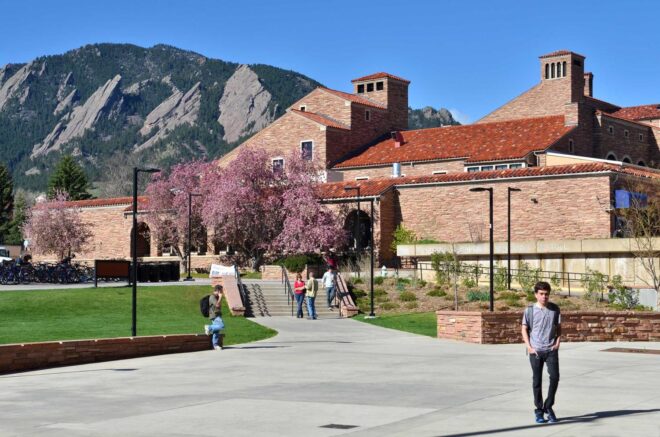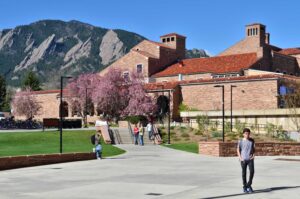
In a dramatic turn of events at the University of Colorado Boulder (CU Boulder), a group of students staged a large-scale protest on the campus quad following allegations of racism directed at a professor in a recent classroom incident. The protest, which took place on October 16, 2024, drew hundreds of students, faculty, and community members who demanded accountability, transparency, and systemic changes within the university’s academic framework.
The Incident
The controversy erupted after an anonymous student alleged that a tenured professor, Dr. Mark Thompson, made a series of racially insensitive comments during a lecture on social justice. According to the student’s account, Dr. Thompson was discussing the historical context of systemic racism in the United States when he reportedly stated that “people need to get over their obsession with race” and suggested that “reverse racism is just as harmful as traditional racism.”

The comments sparked immediate outrage among students, particularly those in the African American Studies and Ethnic Studies programs. The anonymous complaint quickly circulated on social media, leading to widespread condemnation and calls for action from various student organizations, including the Black Student Alliance and the Latinx Student Alliance.
The Student Response
Fueled by anger and frustration, students organized a protest to voice their concerns about the incident and to advocate for a more inclusive and respectful educational environment. The protest began at noon and lasted for over three hours, with participants chanting slogans such as “Silence is complicity!” and “Racism has no place in our classrooms!”
During the demonstration, students held signs with messages like “Educate, Don’t Discriminate” and “Accountability Now!” Many students expressed that the incident was not just about one professor’s comments but part of a larger pattern of insensitivity towards marginalized communities at the university.
“I felt compelled to come out today because this isn’t just an isolated incident,” said junior Jessica Martinez, a member of the Black Student Alliance. “This reflects a deeper issue within the institution that we need to address. Our voices matter, and we will not be silenced.”
The protest featured several speakers, including students, faculty members, and local community leaders. They shared personal stories about their experiences with racism and discrimination at CU Boulder, calling for immediate action from university administration.
University Administration’s Response
In response to the protest and the allegations against Dr. Thompson, CU Boulder’s administration released a statement expressing its commitment to diversity, equity, and inclusion. Chancellor Philip P. DiStefano acknowledged the students’ concerns and emphasized that the university takes such allegations seriously.
“We are committed to fostering an inclusive environment where all students feel safe and respected,” the statement read. “We will conduct a thorough investigation into the allegations against Dr. Thompson and ensure that appropriate actions are taken based on the findings.”
While the administration’s response aimed to calm tensions, many students found it lacking. Some called for a more proactive approach, demanding that the university implement immediate changes to its curriculum and faculty training programs to prevent future incidents.
“Statements are not enough,” said senior Malik Johnson. “We need real action. This university needs to invest in anti-racism training for all faculty and create a more supportive environment for students of color.”
Calls for Policy Changes
The protest also highlighted several longstanding demands from students for policy changes at CU Boulder. These include:
1. Mandatory Anti-Racism Training: Students are calling for all faculty members to undergo training on cultural competency, anti-racism, and inclusivity as part of their professional development.
2. Creation of a Diversity Council: Protesters are advocating for the establishment of a council that includes students, faculty, and community members to address issues related to diversity, equity, and inclusion on campus.
3. Increased Funding for Support Services: Students are demanding that the university allocate more resources to support services for students of color, including counseling and mentorship programs.
4. Enhanced Reporting Mechanisms: Students want the university to implement more accessible and transparent reporting mechanisms for incidents of discrimination and harassment, ensuring that students feel safe when coming forward with complaints.
5. Review of Faculty Hiring Practices: The protest called for a review of hiring practices to ensure that diverse candidates are prioritized in faculty recruitment processes.
Reactions from Faculty and Alumni
The protest and the allegations against Dr. Thompson have drawn mixed reactions from faculty and alumni. Some faculty members expressed solidarity with the students, calling for more robust efforts to combat racism within the academic environment. Dr. Sarah Lee, a professor in the Ethnic Studies department, voiced her support for the protesters, stating, “Students have every right to demand accountability and change. We need to listen to their voices and work together to create a more inclusive campus.”
However, some alumni expressed concern about the potential impact of the protest on academic freedom. “While it’s important to address racism, we must also protect the ability of professors to engage in open dialogue, even if their views are controversial,” said alumni Tom Reynolds. “We should encourage discourse rather than shutting it down.”
Broader Implications
The events at CU Boulder reflect a growing national conversation about race, inclusivity, and academic freedom in higher education. Many universities across the country are grappling with similar issues, leading to protests, demands for policy changes, and calls for accountability.
As universities strive to create inclusive environments, the balance between free expression and the need for respectful dialogue remains a contentious issue. The situation at CU Boulder underscores the importance of addressing systemic racism within academic institutions while upholding the principles of academic freedom.
Next Steps
In the aftermath of the protest, student leaders are planning to meet with university administrators to discuss their demands and push for meaningful changes. They have also called for continued engagement and dialogue among students, faculty, and staff to address issues of racism and discrimination on campus.
“We are not going away,” said Jessica Martinez. “This is just the beginning. We will continue to fight for our rights and for a campus where everyone feels valued and respected.”
As CU Boulder moves forward, the university community will undoubtedly be watching closely to see how administrators respond to the demands of the students and what steps will be taken to create a more inclusive and supportive environment for all.
Conclusion
The recent allegations against Dr. Thompson and the subsequent protest at CU Boulder highlight the urgent need for universities to confront issues of racism and discrimination head-on. As students, faculty, and community members come together to advocate for change, the university has an opportunity to reevaluate its policies and practices, ensuring that all voices are heard and respected. The path forward may be challenging, but it is clear that the fight for justice and equality on campus is far from over.